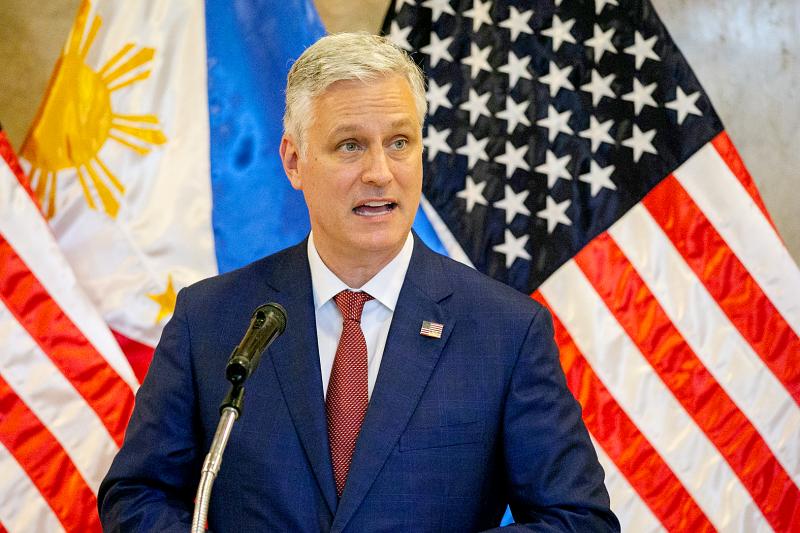US President Donald Trump’s administration on Tuesday declassified a report that casts the defense of Taiwan as critical to the Indo-Pacific strategy of checking China’s ascent, Bloomberg reported yesterday.
“US Strategic Framework for the Indo-Pacific” has governed the US’ strategic response to China since Trump approved it in February 2018, Bloomberg reported, citing a statement by US National Security Adviser Robert O’Brien.
“Beijing is increasingly pressuring Indo-Pacific nations to subordinate their freedom and sovereignty to a ‘common destiny’ envisioned by the Chinese Communist Party [CCP],” O’Brien was cited as saying.

Photo: Reuters
The report assumes that China would “take increasingly assertive steps to compel unification with Taiwan,” Bloomberg quoted the document as saying.
China’s presumptive aim is to “dissolve US alliances and partnerships in the region” before moving to “exploit vacuums and opportunities created by these diminished bonds,” the report says.
It advises the US to devise and implement a defense strategy that is capable of denying China sustained air and sea dominance inside the first island chain in a war, and defending Taiwan and other first nations on the island chain.
Part of that defense strategy would be to enable “Taiwan to develop an asymmetric defense strategy and capabilities” that would allow the nation to “engage China on its own terms,” the report says.
The report highlights China’s “predatory economic practices” that “freeze out” foreign competition, undermining US competitiveness and furthering the CCP’s ambitions to “dominate the 21st-century economy.”
Beijing is also expected to seek dominion over “cutting-edge technologies, including artificial intelligence and bio-genetics, and to harness them in the service of authoritarianism,” the report says.
The US should contend with China’s economic practices by building an international consensus that Beijing’s industrial and unfair trade politics are detrimental to the global trading system, it says.
Chinese Ministry of Foreign Affairs spokesman Zhao Lijian (趙立堅) yesterday said that the strategic framework for the Indo-Pacific contradicts the “solemn promises of the US” regarding its policy toward Taiwan.
“The US should turn away from an erroneous and dangerous path that could jeopardize peace and stability in the Taiwan Strait, and harm China-US relations,” he said.
Zhao made the remarks at a routine news conference and reiterated Beijing’s “one China” principle that “Taiwan is an inseparable sovereign territory of China.”
“The content of the documents betrays the vile intentions of the US Indo-Pacific strategy to suppress China and to damage regional peace and stability,” he said, calling the document “a strategy to maintain hegemony.”
“China has the determination, confidence and ability to defeat external forces’ attempts at interference or Taiwanese independence conspiracies,” he said.
“Any ploy to check China with Taiwan is futile,” Zhao added.
The document’s allegations that China is ratcheting up the pressure on neighboring countries are “malicious distortions and lies,” he said.

‘FORM OF PROTEST’: The German Institute Taipei said it was ‘shocked’ to see Nazi symbolism used in connection with political aims as it condemned the incident Sung Chien-liang (宋建樑), who led efforts to recall Democratic Progressive Party (DPP) Legislator Lee Kun-cheng (李坤城), was released on bail of NT$80,000 yesterday amid an outcry over a Nazi armband he wore to questioning the night before. Sung arrived at the New Taipei City District Prosecutors’ Office for questioning in a recall petition forgery case on Tuesday night wearing a red armband bearing a swastika, carrying a copy of Adolf Hitler’s Mein Kampf and giving a Nazi salute. Sung left the building at 1:15am without the armband and apparently covering the book with a coat. This is a serious international scandal and Chinese

PERSONAL DATA: The implicated KMT members allegedly compiled their petitions by copying names from party lists without the consent of the people concerned Judicial authorities searched six locations yesterday and questioned six people, including one elderly Chinese Nationalist Party (KMT) member and five KMT Youth League associates, about alleged signature forgery and fraud relating to their recall efforts against two Democratic Progressive Party (DPP) legislators. After launching a probe into alleged signature forgery and related fraud in the KMT’s recall effort, prosecutors received a number of complaints, including about one petition that had 1,748 signatures of voters whose family members said they had already passed away, and also voters who said they did not approve the use of their name, Taipei Deputy Chief Prosecutor

UNDER ATTACK: Raymond Greene said there were 412 billion malicious threats in the Asia-Pacific region in the first half of 2023, with 55 percent targeting Taiwan Taiwan not only faces military intimidation from China, but is also on the front line of global cybersecurity threats, and it is taking action to counter those attacks, President William Lai (賴清德) said yesterday. Speaking at the opening of this year’s Cybersec Expo in Taipei, the president assured foreign diplomats and exhibitors that Taiwan remained committed to strengthening its defense against cyberattacks and enhancing the resilience of its digital infrastructure. Lai referenced a report from the National Security Bureau (NSB) indicating that the Government Service Network faced an average of 2.4 million intrusion attempts daily last year, more than double the figure

Retired US general Robert B. Abrams reportedly served as adviser to Chief of the General Staff Admiral Mei Chia-shu (梅家樹) during the Ministry of National Defense’s computer-simulated war games in the buildup to this year’s 41st annual Han Kuang military exercises, local media reported yesterday. For 14 days and 13 nights starting on April 5 and ending yesterday, the armed forces conducted the computer-simulated war games component of the Han Kuang exercises, utilizing the joint theater-level simulation system (JTLS). Using the JTLS, the exercise simulated a continuous 24-hour confrontation based on scenarios such as “gray zone” incursions and the Chinese People’s Liberation